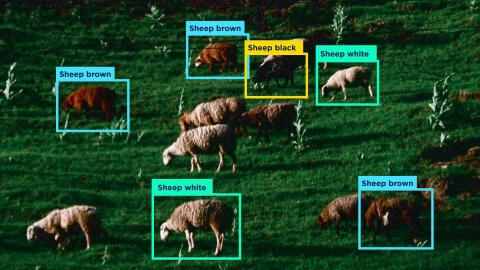Data science can help transform common ways the healthcare industry provides treatment plans and distributes physician workload. From predictive analytics improving treatment decisions to personalized chatbot assistants powered with data science algorithms, the healthcare field can benefit from AI integration in numerous ways. Data science redefines healthcare delivery and ensures patient care is more data-driven and personalized.
In this article, we review seven data science applications that will boost healthcare industry improvements, including data-driven clinical decision-making, medical imaging, surgeon assistance, drug discovery, remote patient monitoring, disease tracking and prevention, and patient assistance via chatbots.
You can also explore this topic in the video-article format on our YouTube channel.
What is data science in healthcare?
Data science in healthcare involves using machine learning algorithms to analyze data and extract practical insights applicable to medical facilities and patients. Data science engineers employ numerous data analysis techniques to gather, process, and interpret data. They train and integrate algorithms into medical software or wearable devices to handle complex, unstructured datasets to help physicians with their professional responsibilities. Data science can be used for administrative tasks and more complicated medical assistance.
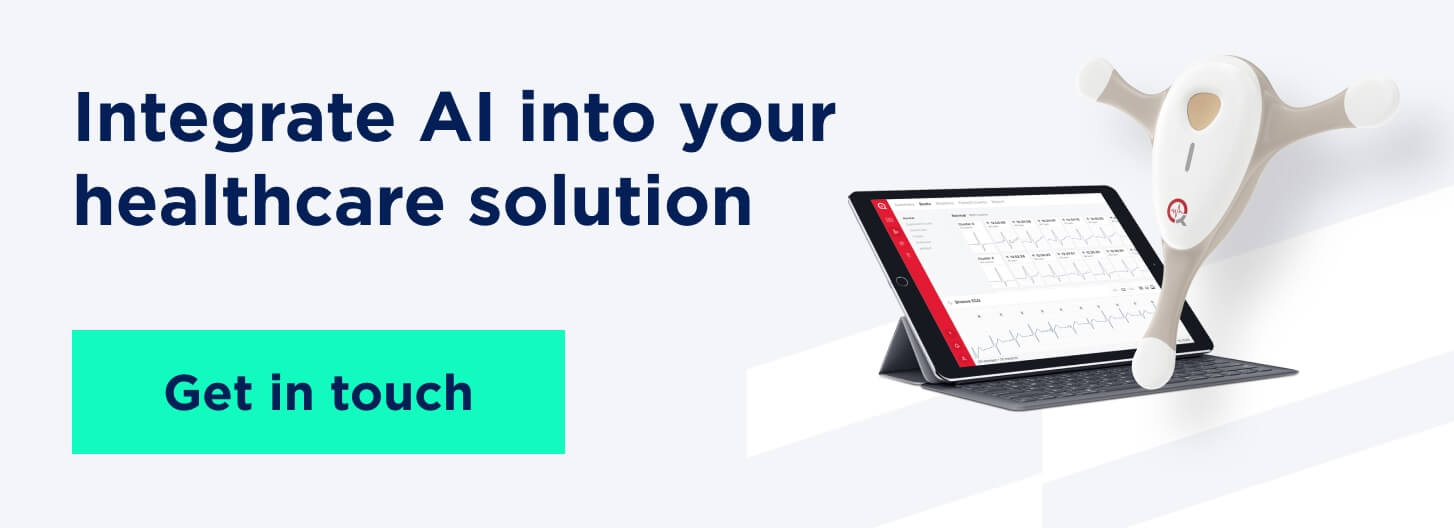
Benefits of using data science algorithms in healthcare
Artificial intelligence can significantly reduce the expenses associated with drug discovery by up to 70%. Using predictive AI, hospitals can reduce their admissions by 50%. The use of AI in the healthcare market was estimated at $20.9 billion in 2024 and is expected to grow to $148.4 billion by 2029, with a 48.1% CAGR.
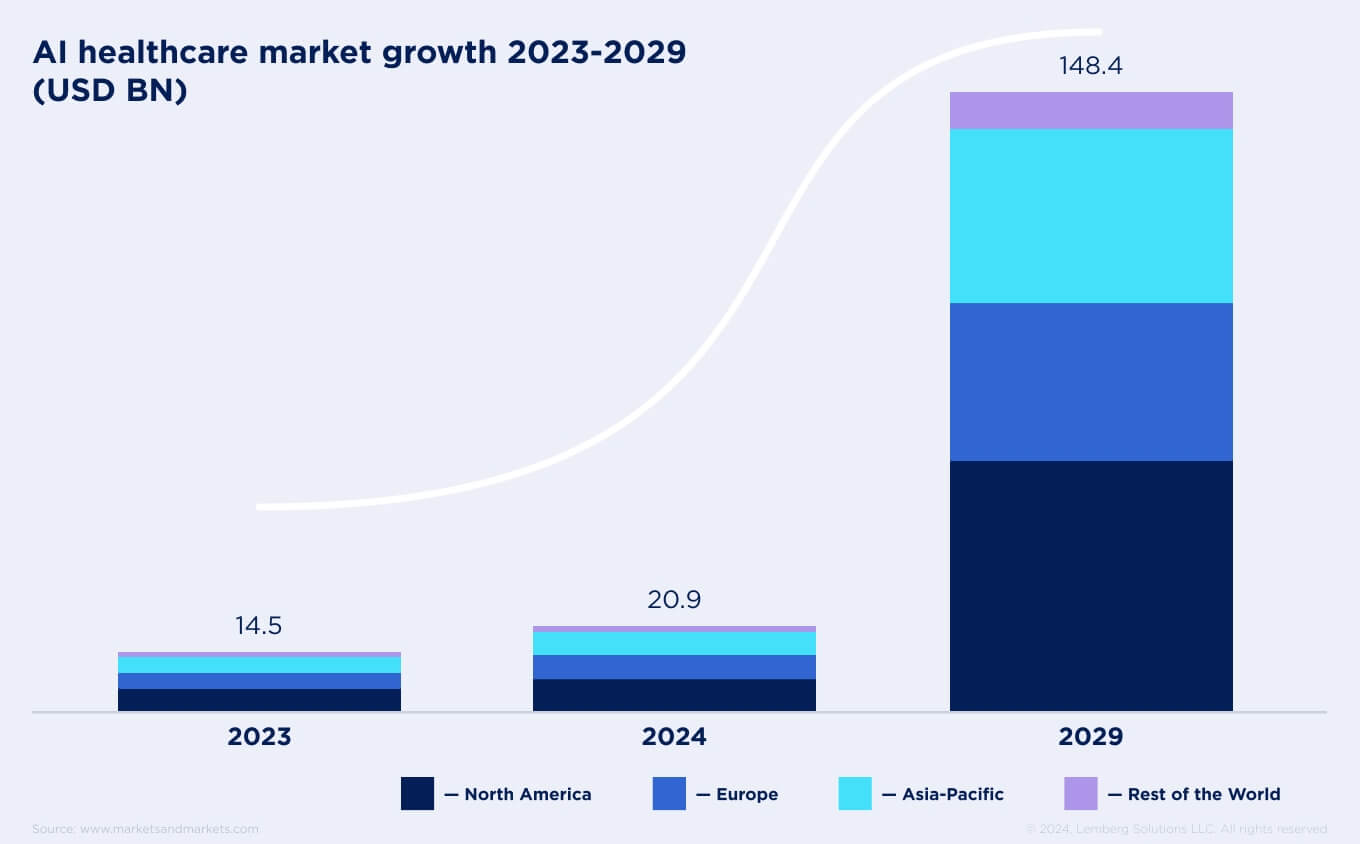
Reduced treatment failure
One of the most anticipated benefits of data science is the decrease in treatment errors. Accurate predictions about patients’ course of disease will lead to better prescription choices. ML algorithms analyze vast amounts of patient data and help detect illness symptoms for more accurate diagnoses. With more informed treatment options, physicians can accelerate patient’s recovery.
Improved healthcare workflow
Data science algorithms can automate resource planning. Usually, patients need to collect their medical records before the appointment, which is a time-consuming and complex task for those not knowledgeable in the medical sphere. During appointments, physicians have to look through various records and patient histories while having significant time constraints. By leveraging cloud-based software with integrated ML models, medical specialists can swiftly retrieve patient data without the need for time-consuming record gathering. With such workflow automation, physicians pay more attention to patient treatment and spend less time on administrative tasks. This optimizes the use of healthcare data.
Decreased manual errors
Data science solutions can reduce manual errors. Considering employee burnout is a common issue in healthcare facilities, data science experts’ intervention could reduce the workload and prevent mistakes caused by chronic fatigue. With automation tools handling repetitive tasks, healthcare professionals can direct all their efforts on treatment and learning.
Improved patient experience during treatment
Collecting extensive health data, engineers can develop AI-enabled algorithms that create personalized treatment plans tailored to individual patient needs and health records. The algorithms can analyze the differences between disease spans among multiple patients to predict the best medications for each. As a result, patients receive customized care and have an improved experience with healthcare facilities.
Data science applications in healthcare
Advancements in data science technology offer more and more ways to help medical professionals and patients improve treatment. Read how data science is used in healthcare below.
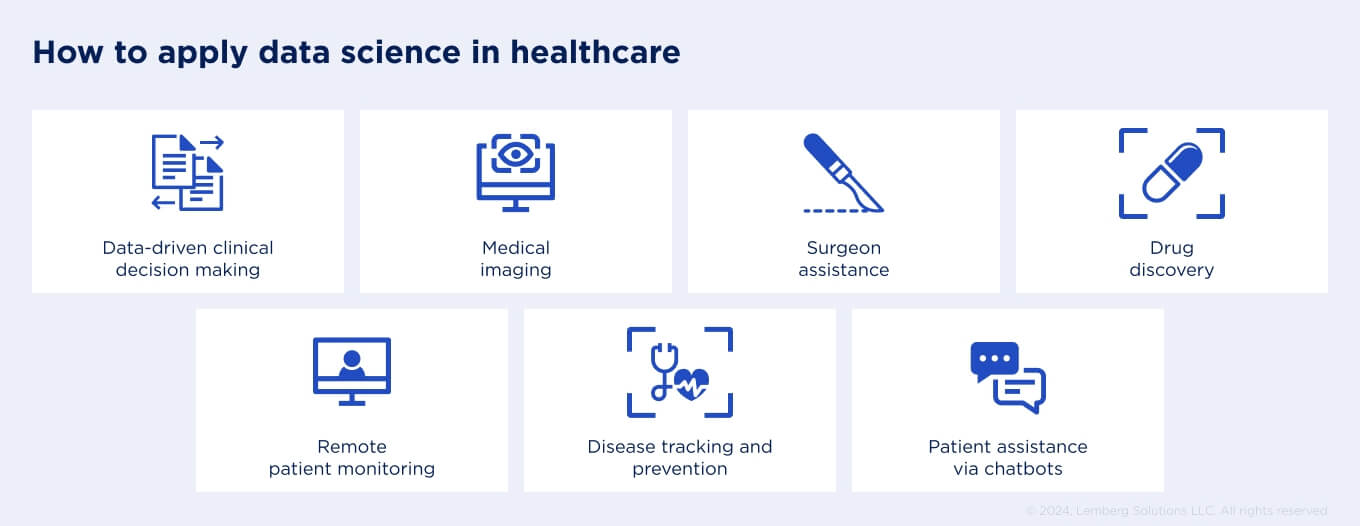
1. Data-driven clinical decision making
Predictive analytics in healthcare provides valuable insights to health professionals, ensuring early disease prevention or treatment plan changes. Data science algorithms process real-time data to find any unusual patterns and help doctors improve patient care. By implementing specific data science tools, engineers can create medical solutions that can change standard medical practices regarding patients with chronic conditions. With predictive analytics, data science engineers can increase the accuracy of decision-making, which leads to better treatment strategies and risk evaluation.
2. Medical imaging
Through computer vision integration in medical imaging tasks, data science engineers can improve healthcare diagnostics. The algorithms can quickly analyze images and detect even early signs of illness with high accuracy. With computer vision algorithms, medical professionals can find disease signs invisible to the human eye. As a result, they can intervene in early-stage illness treatment and adjust medical procedures to the discovered data. Data science in medicine helps automate certain workflows to help resolve physician shortage issues. For instance, the data science team can integrate GenAI into the medical software to automate report generation.
3. Surgeon assistance
Another way to apply computer vision within the healthcare sector is AI-assisted surgery. During operations, surgeons can receive real-time data on the surgical instrument's location. It is especially useful for complex operations when the instruments aren’t directly visible to the surgeons. To make such a solution work, data scientists in the healthcare industry label specific points on the instruments to train computer vision algorithms to recognize them. The algorithms can locate the instruments even during dynamic movements in real time.
4. Drug discovery
Drug discovery in the pharmaceutical industry is challenging and requires innovation through machine learning algorithms. Data science engineers can develop AI systems that enhance the search for new treatment opportunities, accelerate drug trials, assist in developing drug safety standards, and improve drug screening processes. All in all, the data science and medicine combination will significantly change pharmaceutical research.
5. Remote patient monitoring
Integrating data science algorithms into IoT devices for remote patient monitoring helps patients track their health indicators. This improves patients’ well-being and allows physicians to monitor and manage treatment plans. With remote monitoring, patients who cannot reach the hospitals on a regular basis can get proper health management. The algorithms will gather and process vital indicators and provide them to physicians for further analysis.
Learn how our data science and embedded engineers developed an IoT telemedicine platform that uses ML algorithms to process sound and provide physicians with only the needed audio files. Since our company holds ISO 13485:2016 certification that regulates medical device safety and quality, we ensure that gathered data is protected.
6. Disease tracking and prevention
Data science algorithms for healthcare can help track disease spread and predict future infection zones. Such ML-enabled systems can track the needed metrics, including outbreak period and the number of cases, to forecast spread. The algorithms can monitor search queries, social media posts, and healthcare facility data on illness cases to increase the accuracy of predictions and analyze the sentiment.
7. Patient assistance via chatbots
Among all applications of data science, generative AI proves useful too. Integrating GenAI into chatbots, data science engineers build systems that provide valuable assistance to patients by swiftly addressing their queries. Medical professionals can rely on such chatbots to address specific medical questions and provide personalized responses. Moreover, a chatbot can guide individuals to the appropriate healthcare professional based on their symptoms.
Check out how our data science engineers developed a GenAI-powered chatbot that can use your custom dataset to provide patient assistance and answer their questions.
How we can help
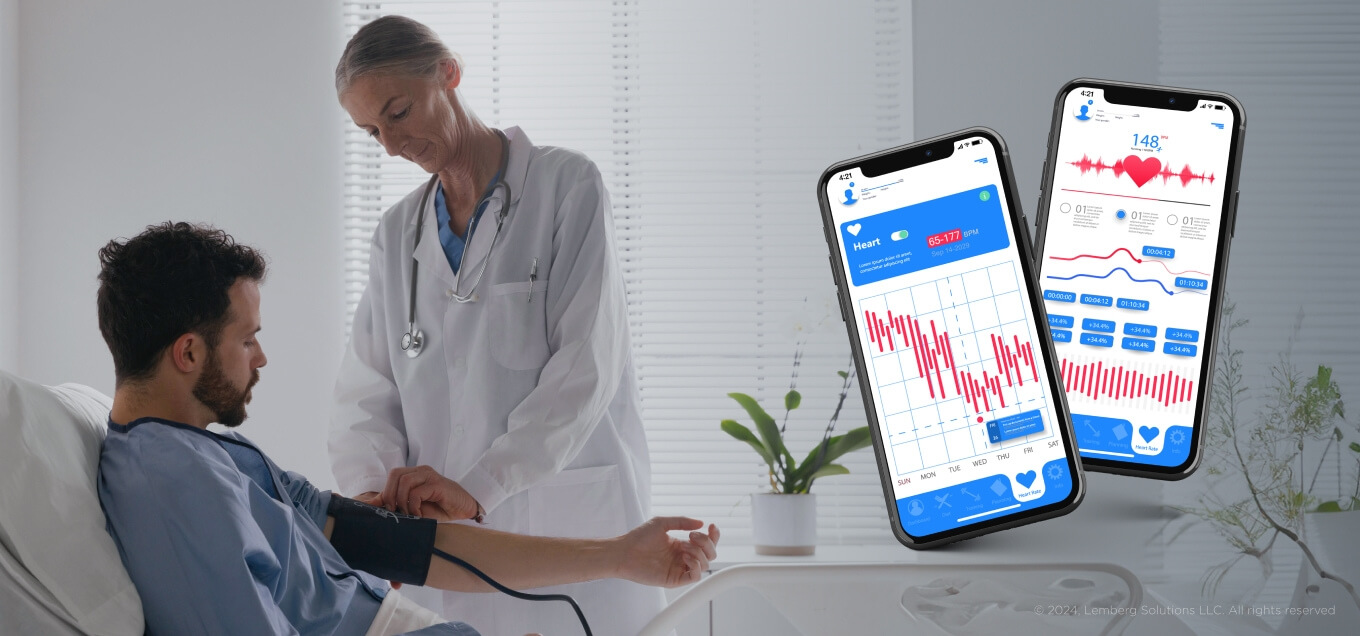
Our data science team can create a custom FAQ chatbot using GenAI technology. The bot maintains quick and personalized interactions with the customers using your knowledge base for more accurate answers. Even as the number of customer inquiries grows, the NLP-powered chatbot remains efficient and fast.
Moreover, we can create other solutions advanced with data science, such as a motion detection system based on computer vision algorithms, a sound detection system for remote health monitoring, and predictive analytics algorithms that can track the disease span and forecast potential outcomes, which allows physicians to choose better treatment plans.
Takeaway
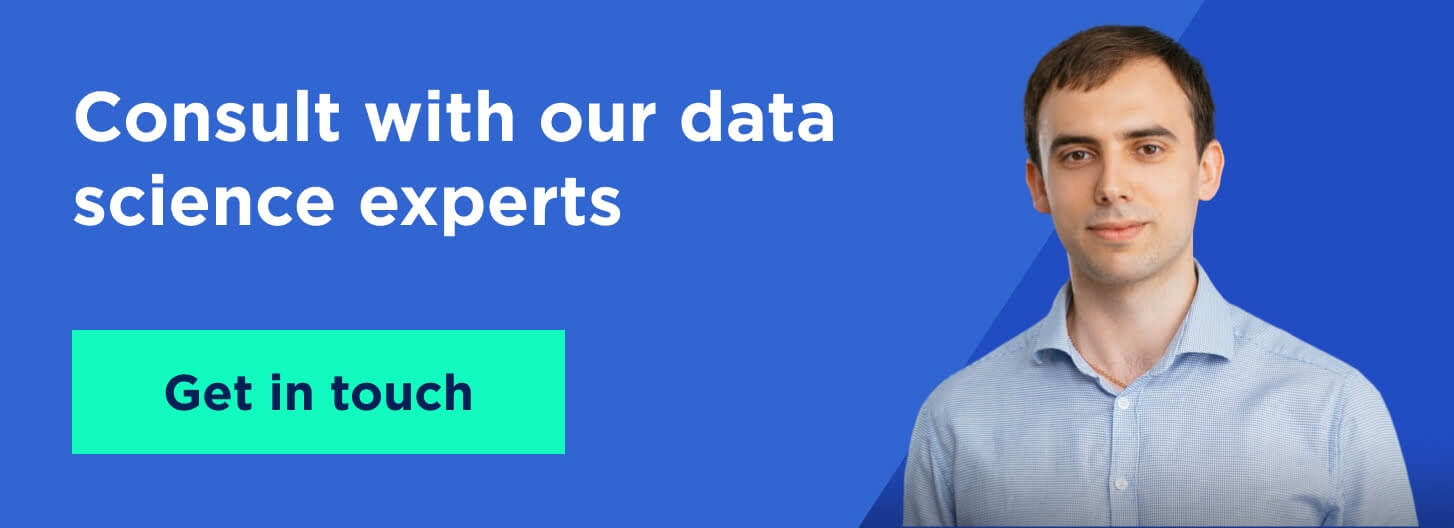
Data science and healthcare are becoming increasingly interconnected due to the benefits ML algorithms can provide for the industry. Data science engineers ensure advancements in the healthcare industry by integrating ML algorithms that can be used for remote patient monitoring, data-driven clinical decision-making, surgeon assistance, disease tracking and prevention, medical imaging, drug discovery, and patient assistance via chatbots.
Implement data science into your healthcare solution with our experts. Schedule a call and discover how you can transform your product with AI.




